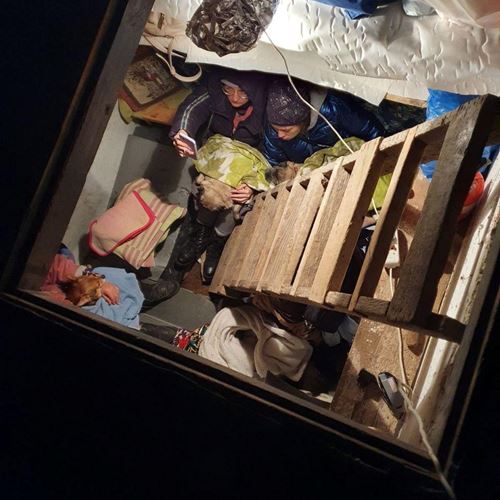‘There was just enough space to fit in nine people in the tiny basement – and some had also brought their small pets with them. We – my parents and I - spent two weeks there, crammed together during some of the worst bombings in Mykolaiv we had seen since the war began. All the time, we heard the shelling. Sometimes we went out to do a little shopping in some of the markets and shops that were still working at the time.’
Anton*, 17-years-old, is happy about being away from the bombing, and sad about being too far from the home, friends and life in Ukraine that he misses. He and his parents left Ukraine mid-March when the bombings intensified in the area near Mykolaiv city where they lived. They drove through Odesa and were allowed to cross the border into Moldova where they parked their car. Anton is below 18 and his father 66, meaning both just outside the age limits that would otherwise oblige them to serve the army. Women in Ukraine are so far exempted from conscription and can freely leave Ukraine.
‘We came to Chisinau and were given a room here at the Refugee Accommodation Center,’ says Anton in fluent English. The spent some time at the shelter but flew to the United States where they have relatives and friends. After almost five months there, money ran out, they needed a car to get around, and eventually they decided to return to Moldova to also be closer to home in Ukraine.
Creating more space
The Refugee Accommodation Center has capacity to host 220 people. Space there has nearly doubled since DRC supported the center with new bunkbeds, washing machines, stoves and cooking utensils and other items that allow for the refugees to better manage their daily lives. They will be able to stay there as long as needed, they are told, and with no end date set by the hosts.
‘We have what we need here for now. There is space for us, warm water, and food,’ says Anton’s mother. ‘There are also house rules to make sure that we all contribute to keep the place cleaned and in good order,’ she tells.
The Government of the Republic of Moldova runs 66 Refugee Accommodations Center across the small country of 2.6 million people, with only the center in Chisinau being from before the war in Ukraine broke out. It used to be a kindergarten since it was constructed in 1978, and later, in 2003, turned into the national refugee asylum center of Moldova.
Abandoned countryside school turned into refugee shelter
In the village Cojusna in Straseni district, around one hour’s drive from Chisinau, the capital of Moldova, the classrooms of a former primary school are now turned into dorms each for six people and offering space for 100 refugees in total. Currently 74 refugees are hosted here, all from Ukraine and most from Kherson, Mykolaiv and Odesa. 62 of them are Ukrainian nationals, and 12 are from the Roma population, a large ethnic minority in the region.
This center is one of the recently established official Refugee Accommodation Centers across Moldova under the coordination of the national Crisis Management Centre. The center is managed by local authorities from where one person is delegated to monitor the needs in the centre on behalf of Municipality. Local volunteers help the residents with cooking and other daily needs.
The former primary school was closed some time back – before the war in Ukraine - due to a lack of students in the area that is remote and located away from nearby towns. Refugees are free to move around and can take public transport into Chisinau where they need to go to find specific services, including health and medical treatment options.
